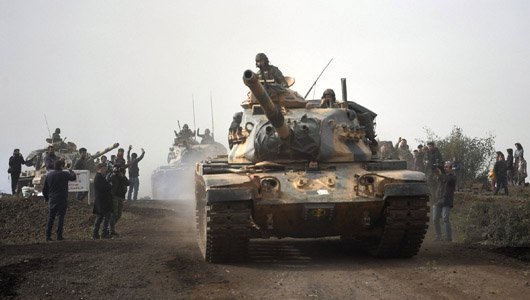by WorldTribune Staff, January 24, 2018
As Turkish forces began their offensive in Syria’s Kurdish-governed district of Afrin, Turkish President Recep Tayyip Erdogan promised victory within “a very short period of time.”
“That may be a fatal miscalculation, one which could cripple Turkey,” former Pentagon official Michael Rubin wrote in an op-ed for the Washington Examiner on Jan. 22.

Meanwhile, the combat-tested Kurdish fighters, who have long been staunch supporters of U.S. interests and played a critical role in the destruction of ISIS, are getting support from Op-Ed columns and U.S. organizations such as the Endowment for Middle East Truth.
“Turkey’s military is a shadow of its former self,” Rubin wrote. “The same can’t be said for the YPG.”
Rubin noted that “Once the pride of NATO, the Turkish military and security services are a shadow of their former self. They lack the experience, training, and discipline of their predecessors. One in four Turkish pilots is in prison; many Turkish F-16s are grounded for lack of trained pilots. In 2012, Syrian forces downed a Turkish F-4, and Kurds have downed Turkish helicopters.”
While Turkey’s air force has its problems, it is also not clear if the Turkish army “can fight effectively,” Rubin noted.
“The Turks may occupy pockets in Syria, but their presence has long been more symbolic than real. One of the reasons the Turkish intelligence service (MIT) supplied and supported the Al Qaida-affiliated Nusra Front and allowed the Islamic State free transit across Turkish territory was a quid pro quo in order to protect Turkish interests inside Syria. In short, Erdogan wanted to assume the status of military commander without actually having to fight the tough battles that originally elevated Mustafa Kemal Ataturk, founder of the Republic of Turkey, to prominence.”
Rubin noted that the YPG “has been the most effective fighting force on the ground in Syria against Al Qaida and ISIS. For years, they operated alone – ignored by the United States and Russia, isolated by other Syrian opposition groups, and embargoed by Turkey. And yet, at Kobane and elsewhere, their discipline, high morale, and cohesion paid off. If they could operate against all odds against ISIS, they can likewise be a formidable opponent against Turkey, especially with home field advantage.”
Turkey’s other nemesis, the PKK, is far from “amateurish, especially after years of hardening in battle,” Rubin wrote. “In another incident censored by Turkey, PKK operatives managed to capture two of Turkey’s leading intelligence officials.”
Erdogan, Rubin wrote, “operates in a domain of ego and ambition unencumbered by reality. He brands those who question him as terrorists, and so top aides understand they must tell him only what he wishes to hear. The result, now that Turkish forces are moving into Afrin against an opponent stronger than Erdogan realizes, could be disaster for Turkey.”
The Endowment for Middle East Truth (EMET), said in a Jan. 22 press release that Afrin “is 90 percent Kurdish mixed with Arabs, and the people have put forth a democratic system that accounts for equal representation for both men and women.”
Sarah Stern, founder and president of EMET, said “The Kurds are the new Jews; they have been stateless, everyone hates them, and they defend their own people with their own blood. And the Kurds are a strategic ally to the United States; they have led the fight against ISIS, are pro-Western and pro-American. It is in the United States’ best interest to support our Kurdish friends.”
Fox news strategic analyst Ralph Peters urged the U.S. not to abandon the Kurds.
“Restricted use of a single air base has paralyzed our Turkey policy,” Peters wrote in a Jan. 22 op-ed for the New York Post. “Unquestionably, Incirlik air base, in southeastern Turkey, has a prime strategic location. Our operations would be more challenging without it. And Turkey uses that as leverage.”
But, Peters wrote, “It’s time to call Erdogan’s bluff. We should not sacrifice the future of 30 million to 40 million pro-American Kurds for the sake of a couple of runways.”
Peters continued: “What should we do to stop Turkey from using U.S.-supplied, U.S.-made weapons to kill our only dependable regional allies outside of Israel? It’s time to embrace the future rather than clinging to the past. It’s time to imagine a strategy without Incirlik air base and with Turkey suspended from NATO until it returns to the rule of law and honest elections.”
It is also “time to recognize that the Kurds deserve and have earned a state of their own,” Peters wrote.
Subscribe to Geostrategy-Direct __________ Support Free Press Foundation
